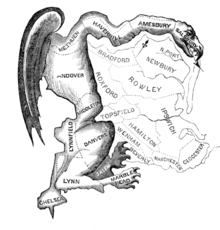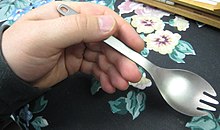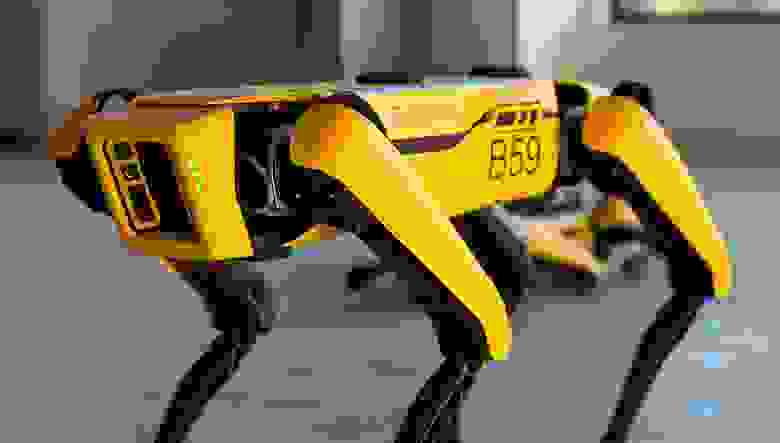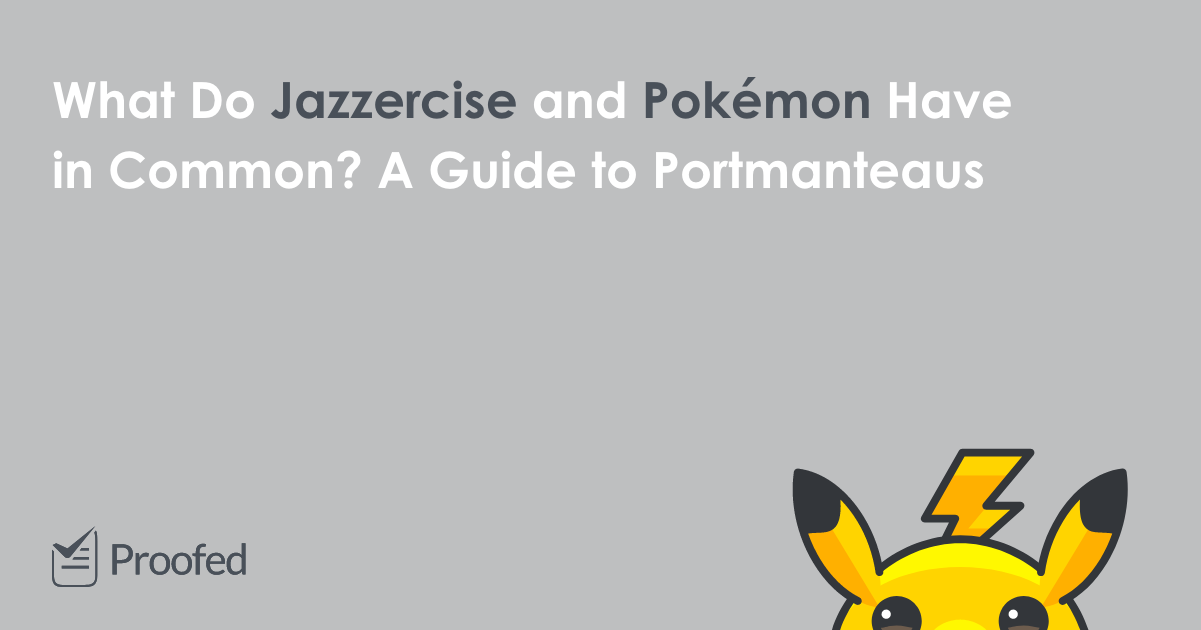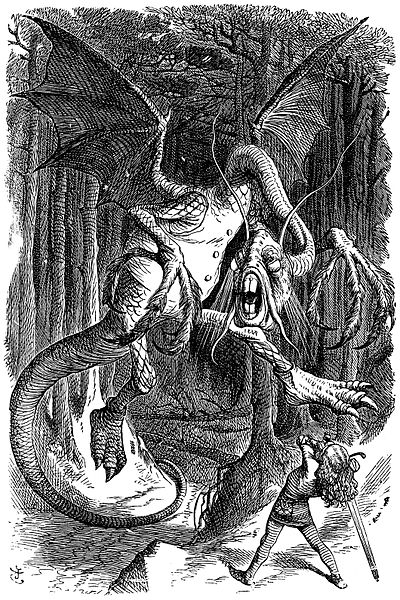From Wikipedia, the free encyclopedia
A portmanteau word, or portmanteau (, ) is a blend of words[1] in which parts of multiple words are combined into a new word,[1][2][3] as in smog, coined by blending smoke and fog,[2][4] or motel, from motor and hotel.[5] In linguistics, a portmanteau is a single morph that is analyzed as representing two (or more) underlying morphemes.[6][7][8][9] When portmanteaus shorten established compounds, they can be considered clipped compounds.[10]
A portmanteau word is similar to a contraction, but contractions are formed from words that would otherwise appear together in sequence, such as do and not to make don’t, whereas a portmanteau is formed by combining two or more existing words that all relate to a single concept. A portmanteau also differs from a compound, which does not involve the truncation of parts of the stems of the blended words. For instance, starfish is a compound, not a portmanteau, of star and fish, as it includes both words in full. If it were called a «stish» or a «starsh», it would be a portmanteau.
Origin[edit]
The word portmanteau was introduced in this sense by Lewis Carroll in the book Through the Looking-Glass (1871),[11] where Humpty Dumpty explains to Alice the coinage of unusual words used in «Jabberwocky».[12] Slithy means «slimy and lithe» and mimsy means «miserable and flimsy». Humpty Dumpty explains to Alice the practice of combining words in various ways, comparing it to the then-common type of luggage, which opens into two equal parts:
You see it’s like a portmanteau—there are two meanings packed up into one word.
In his introduction to his 1876 poem The Hunting of the Snark, Carroll again uses portmanteau when discussing lexical selection:[12]
Humpty Dumpty’s theory, of two meanings packed into one word like a portmanteau, seems to me the right explanation for all. For instance, take the two words «fuming» and «furious». Make up your mind that you will say both words, but leave it unsettled which you will say first … if you have the rarest of gifts, a perfectly balanced mind, you will say «frumious».
In then-contemporary English, a portmanteau was a suitcase that opened into two equal sections. According to the OED Online, a portmanteau is a «case or bag for carrying clothing and other belongings when travelling; (originally) one of a form suitable for carrying on horseback; (now esp.) one in the form of a stiff leather case hinged at the back to open into two equal parts».[13] According to The American Heritage Dictionary of the English Language (AHD), the etymology of the word is the French porte-manteau, from porter, «to carry», and manteau, «cloak» (from Old French mantel, from Latin mantellum).[14] According to the OED Online, the etymology of the word is the «officer who carries the mantle of a person in a high position (1507 in Middle French), case or bag for carrying clothing (1547), clothes rack (1640)».[13] In modern French, a porte-manteau is a clothes valet, a coat-tree or similar article of furniture for hanging up jackets, hats, umbrellas and the like.[15][16][17]
An occasional synonym for «portmanteau word» is frankenword, an autological word exemplifying the phenomenon it describes, blending «Frankenstein» and «word».[18]
Examples in English[edit]
Many neologisms are examples of blends, but many blends have become part of the lexicon.[12] In Punch in 1896, the word brunch (breakfast + lunch) was introduced as a «portmanteau word».[19] In 1964, the newly independent African republic of Tanganyika and Zanzibar chose the portmanteau word Tanzania as its name. Similarly Eurasia is a portmanteau of Europe and Asia.
Some city names are portmanteaus of the border regions they straddle: Texarkana spreads across the Texas-Arkansas-Louisiana border, while Calexico and Mexicali are respectively the American and Mexican sides of a single conurbation. A scientific example is a liger, which is a cross between a male lion and a female tiger (a tigon is a similar cross in which the male is a tiger).
Many company or brand names are portmanteaus, including Microsoft, a portmanteau of microcomputer and software; the cheese Cambozola combines a similar rind to Camembert with the same mould used to make Gorgonzola; passenger rail company Amtrak, a portmanteau of America and track; Velcro, a portmanteau of the French velours (velvet) and crochet (hook); Verizon, a portmanteau of veritas (Latin for truth) and horizon; and ComEd (a Chicago-area electric utility company), a portmanteau of Commonwealth and Edison.
Jeoportmanteau! is a recurring category on the American television quiz show Jeopardy! The category’s name is itself a portmanteau of the words Jeopardy and portmanteau. Responses in the category are portmanteaus constructed by fitting two words together.
Portmanteau words may be produced by joining proper nouns with common nouns, such as «gerrymandering», which refers to the scheme of Massachusetts Governor Elbridge Gerry for politically contrived redistricting; the perimeter of one of the districts thereby created resembled a very curvy salamander in outline. The term gerrymander has itself contributed to portmanteau terms bjelkemander and playmander.
Oxbridge is a common portmanteau for the UK’s two oldest universities, those of Oxford and Cambridge. In 2016, Britain’s planned exit from the European Union became known as «Brexit».
The word refudiate was famously used by Sarah Palin when she misspoke, conflating the words refute and repudiate. Though the word was a gaffe, it was recognized as the New Oxford American Dictionary‘s «Word of the Year» in 2010.[20]
The business lexicon includes words like «advertainment» (advertising as entertainment), «advertorial» (a blurred distinction between advertising and editorial), «infotainment» (information about entertainment or itself intended to entertain by its manner of presentation), and «infomercial» (informational commercial).
Company and product names may also use portmanteau words: examples include Timex (a portmanteau of Time [referring to Time magazine] and Kleenex),[21] Renault’s Twingo (a combination of twist, swing and tango),[22] and Garmin (portmanteau of company founders’ first names Gary Burrell and Min Kao). «Desilu Productions» was a Los Angeles–based company jointly owned by actor couple Desi Arnaz and Lucille Ball. Miramax is the combination of the first names of the parents of the Weinstein brothers.
Name-meshing[edit]
Two proper names can also be used in creating a portmanteau word in reference to the partnership between people, especially in cases where both persons are well-known, or sometimes to produce epithets such as «Billary» (referring to former United States president Bill Clinton and his wife, former United States Secretary of State Hillary Clinton). In this example of recent American political history, the purpose for blending is not so much to combine the meanings of the source words but «to suggest a resemblance of one named person to the other»; the effect is often derogatory, as linguist Benjamin Zimmer states.[23] For instance, Putler is used by critics of Vladimir Putin, merging his name with Adolf Hitler. By contrast, the public, including the media, use portmanteaus to refer to their favorite pairings as a way to «…giv[e] people an essence of who they are within the same name.»[24] This is particularly seen in cases of fictional and real-life «supercouples». An early known example, Bennifer, referred to film stars Ben Affleck and Jennifer Lopez. Other examples include Brangelina (Brad Pitt and Angelina Jolie) and TomKat (Tom Cruise and Katie Holmes).[24] On Wednesday, 28 June 2017, The New York Times crossword included the quip, «How I wish Natalie Portman dated Jacques Cousteau, so I could call them ‘Portmanteau'».[25]
Holidays are another example, as in Thanksgivukkah, a portmanteau neologism given to the convergence of the American holiday of Thanksgiving and the first day of the Jewish holiday of Hanukkah on Thursday, 28 November 2013.[26][27] Chrismukkah is another pop-culture portmanteau neologism popularized by the TV drama The O.C., merging of the holidays of Christianity’s Christmas and Judaism’s Hanukkah.
In the Disney film Big Hero 6, the film is situated in a fictitious city called «San Fransokyo», which is a portmanteau of two real locations, San Francisco and Tokyo.[28]
Other languages[edit]
Modern Hebrew[edit]
Modern Hebrew abounds with blending. Along with CD, or simply דיסק (disk), Hebrew has the blend תקליטור (taklitór), which consists of תקליט (taklít, ‘phonograph record’) and אור (or, ‘light’). Other blends in Hebrew include the following:[29]
- ערפיח (arpíakh, ‘smog’), from ערפל (arafél, ‘fog’) and פיח (píakh, ‘soot’)
- מדרחוב (midrakhov, ‘pedestrian-only street’), from מדרכה (midrakhá, ‘sidewalk’) and רחוב (rekhóv, ‘street’)
- מחזמר (makhazémer, ‘musical’), from מחזה (makhazé, ‘theatre play’) and זמר (zémer, ‘singing’ [gerund])
- מגדלור (migdalór, ‘lighthouse’), from מגדל (migdál, ‘tower’) and אור (or, ‘light’)
- קרנף (karnáf, ‘rhinoceros’), from קרן (kéren, ‘horn’) and אף (af, ‘nose’)
- רמזור (ramzór, ‘traffic light’), from רמז (rémez, ‘indication’) and אור (or, ‘light’)
- חוטיני (khutíni, ‘thong bikini’), from חוט (khut, ‘string’) and ביקיני (bikíni, ‘bikini’)
Sometimes the root of the second word is truncated, giving rise to a blend that resembles an acrostic:
- תפוז (tapúz, ‘orange’ (fruit)), from תפוח (tapúakh, ‘apple’) and זהב (zaháv, ‘gold’)
- תפוד (tapúd, ‘potato’), from תפוח (tapúakh, ‘apple’) and אדמה (adamá, ‘soil’ or ‘earth’), but the full תפוח אדמה (tapúakh adamá, ‘apple of the soil’ or ‘apple of the earth’) is more common
Irish[edit]
A few portmanteaus are in use in modern Irish, for example:
- Brexit is referred to as Breatimeacht (from Breatain, «Britain», and imeacht, «leave») or Sasamach (from Sasana, «England», and amach, «out»)[30][31]
- The resignation of Tánaiste (deputy prime minister) Frances Fitzgerald was referred to as Slánaiste (from slán, «goodbye» and Tánaiste)[32][33][failed verification]
- Naíonra, an Irish-language preschool (from naíonán, «infants», and gasra, «band»)[34]
- The Irish translation of A Game of Thrones refers to Winterfell castle as Gheimhsceirde (from gheimhridh, «winter», and sceird, «exposed to winds»)[35]
- Jailtacht (from English jail and Gaeltacht, «Irish-speaking region»): the community of Irish-speaking republican prisoners.[36]
Icelandic[edit]
There is a tradition of linguistic purism in Icelandic, and neologisms are frequently created from pre-existing words. For example, tölva ‘computer’ is a portmanteau of tala ‘digit, number’ and völva ‘oracle, seeress’.[37]
Indonesian[edit]
In Indonesian, portmanteaus and acronyms are very common in both formal and informal usage.
Malaysian[edit]
In the Malaysian national language of Bahasa Melayu, the word jadong was constructed out of three Malay words for evil (jahat), stupid (bodoh) and arrogant (sombong) to be used on the worst kinds of community and religious leaders who mislead naive, submissive and powerless folk under their thrall.[citation needed]
Japanese[edit]
A very common type of portmanteau in Japanese forms one word from the beginnings of two others (that is, from two back-clippings).[38] The portion of each input word retained is usually two morae, which is tantamount to one kanji in most words written in kanji.
The inputs to the process can be native words, Sino-Japanese words, gairaigo (later borrowings), or combinations thereof. A Sino-Japanese example is the name 東大 (Tōdai) for the University of Tokyo, in full 東京大学 (Tōkyō daigaku). With borrowings, typical results are words such as パソコン (pasokon), meaning personal computer (PC), which despite being formed of English elements does not exist in English; it is a uniquely Japanese contraction of the English personal computer (パーソナル・コンピュータ, pāsonaru konpyūta). Another example, Pokémon (ポケモン), is a contracted form of the English words pocket (ポケット, poketto) and monsters (モンスター, monsutā).[39] A famous example of a blend with mixed sources is karaoke (カラオケ, karaoke), blending the Japanese word for empty (空, kara) and the Greek word orchestra (オーケストラ, ōkesutora). The Japanese fad of egg-shaped keychain pet toys from the 1990s, Tamagotchi, is a portmanteau combining the two Japanese words tamago (たまご), which means «egg», and uotchi (ウオッチ) «watch». The portmanteau can also be seen as a combination of tamago (たまご), «egg», and tomodachi (友だち), which means «friend».
Some titles also are portmanteaus, such as Hetalia (ヘタリア). It came from Hetare (ヘタレ), which means «idiot», and Italia (イタリア) which means Italy. Another example is Servamp,
which came from the English words Servant (サーヴァント) and Vampire (ヴァンパイア).
Portuguese[edit]
In Brazilian Portuguese, portmanteaus are usually slang, including:
- Cantriz, from cantora (female singer) and atriz (actress), which defines women that both sing and act.[40][41]
- Aborrescente, from aborrecer (annoy) and adolescente (teenager), which is a pejorative term for teenagers.[42][43]
- Pescotapa, from pescoço (neck) and tapa (slap), which defines a slap on the back of the neck.[44][45]
In European Portuguese, portmanteaus are also used. Some of them include:
- Telemóvel, which means mobile phone, comes from telefone (telephone) and móvel (mobile).[46]
- Cantautor, which means Singer-songwriter, and comes from cantor (singer) and autor (songwriter).
Spanish[edit]
Although traditionally uncommon in Spanish, portmanteaus are increasingly finding their way into the language, mainly for marketing and commercial purposes. Examples in Mexican Spanish include cafebrería from combining cafetería «coffee shop» and librería «bookstore», or teletón ‘telethon’ from combining televisión and maratón. Portmanteaus are also frequently used to make commercial brands, such as «chocolleta» from «chocolate» + «galleta.» They are also often used to create business company names, especially for small, family-owned businesses, where owners’ names are combined to create a unique name (such as Rocar, from «Roberto» + «Carlos», or Mafer, from «María» + «Fernanda»). These usages are helpful for registering of a distinguishable trademark.
Other examples:
- Cantautor, which means Singer-songwriter, and comes from cantante (singer) and autor (songwriter).[47]
- Mecatrónica[citation needed] and Ofimática two Neologisms that are blends of mecánica (mechanical) with electrónica (electronics), and oficina (office) with informática (informatics) respectively.
- Espanglish, interlanguage that combines words from both Spanish (Español) and English.
- Metrobús, blend of metro (subway) and autobús.
- Autopista, blend of automóvil (car) and pista (highway).
- Company names and brands with portmanteaus are common in Spanish. Some examples of Spanish portmanteaus for Mexican companies include: The Mexican flag carrier Aeroméxico, (Aerovías de México), Banorte (Bank and North), Cemex (Cement and Mexico), Jumex (Jugos Mexicanos or Mexican Juice), Mabe (from founders Egon MAbardi and Francisco BErrondo), Pemex (Petróleos Mexicanos or Mexican Oil), Softtek (portmanteau and stylization of Software and technology), and Telmex (Teléfonos de Mexico). Gamesa (Galletera Mexicana, S.A. or Mexican Biscuit Company, Inc.) and Famsa (fabricantes Muebleros, S.A.) are examples of portmanteaus of four words, including the «S.A.» (Sociedad Anónima).
- Many more portmanteaus in Spanish come from Anglicisms, which are words borrowed from English, like módem, transistor, códec, email, internet or emoticon.
A somewhat popular example in Spain is the word gallifante,[48] a portmanteau of gallo y elefante (cockerel and elephant). It was the prize on the Spanish version of the children TV show Child’s Play (Spanish: Juego de niños) that ran on the public television channel La 1 of Televisión Española (TVE) from 1988 to 1992.[49]
Portmanteau morph[edit]
In linguistics, a blend is an amalgamation or fusion of independent lexemes, while a portmanteau or portmanteau morph is a single morph that is analyzed as representing two (or more) underlying morphemes.[6] For example, in the Latin word animalis, the ending -is is a portmanteau morph because it is used for two morphemes: the singular number and the genitive case.[citation needed] In English, two separate morphs are used: of an animal. Other examples include French: à le → au [o] and de le → du [dy].[6]
See also[edit]
- Amalgamation (names)
- Hybrid word
- List of geographic portmanteaus
- List of portmanteaus
- Portmanteau sentence
- Syllabic abbreviation
- Pidgin
References[edit]
- ^ a b Garner’s Modern American Usage Archived 27 February 2017 at the Wayback Machine, p. 644.
- ^ a b «Portmanteau». Merriam-Webster Offline Dictionary. Archived from the original on 9 May 2008. Retrieved 21 June 2008.
- ^ «Portmanteau word». The American Heritage Dictionary of the English Language: Fourth Edition. 2000. Archived from the original on 26 November 2007. Retrieved 21 June 2008.
- ^ «portmanteau word». Webster’s New World College Dictionary. Cleveland: Wiley. 2010. ISBN 978-0-7645-7125-1.
- ^ «Portmanteau word». Encyclopædia Britannica. Archived from the original on 15 December 2013. Retrieved 23 August 2013.
- ^ a b c «What is a portmanteau morph?». LinguaLinks Library. 2003. Archived from the original on 19 June 2008.
- ^ Thomas, David (1983). «An invitation to grammar». Summer Institute of Linguistics. Bangkok: Mahidol University: 9.
- ^ Crystal, David (1985). «A dictionary of linguistics and phonetics» (2nd ed.). New York: Basil Blackwell: 237.
- ^ Hartmann, R.R.K.; Stork, F.C. (1972). «Dictionary of language and linguistics». London: Applied Science: 180.
- ^ Fandrych, Ingrid (10 November 2008). «Submorphemic elements in the formation of acronyms, blends and clippings». Lexis (2). doi:10.4000/lexis.713.
- ^ «portmanteau, n.«. Oxford English Dictionary, third edition. Oxford: Oxford University Press. 2010. Retrieved 23 February 2011.
- ^ a b c Fromkin, V., Rodman, R., and Hyams, N. (2007) An Introduction to Language, Eighth Edition. Boston: Thomson Wadsworth. ISBN 1-4130-1773-8.
- ^ a b «portmanteu». Oxford English Dictionary (Online ed.). Oxford University Press. Retrieved 18 July 2019. (Subscription or participating institution membership required.)
- ^ «Portmanteau». The American Heritage Dictionary of the English Language: Fourth Edition. 2000.
- ^ Petit Robert: portemanteau – «malle penderie» (suitcase in which clothes hang).
- ^ «PORTEMANTEAU : Définition de PORTEMANTEAU». cnrtl.fr (in French). Archived from the original on 21 August 2014.
- ^ Such a «coat bag» is mentioned in Chapter 12 of Alexander Dumas’ The Count of Monte Cristo.
- ^ «Frankenwords: They’re Alive!» The Guardian, 5 February 2016. Archived 10 January 2017 at the Wayback Machine.
- ^ Punch, 1 August 1896, 58/2
- ^ «NEW OXFORD AMERICAN DICTIONARY’S 2010 WORD OF THE YEAR IS…» Archived from the original on 16 January 2012. Retrieved 30 January 2012.
- ^ Tully, Shawn (7 March 2015). «The crazy, true-life adventures of Norway’s most radical billionaire». Fortune. Archived from the original on 28 July 2016.
A few years later Thomas Olsen would rechristen the company Timex. He hatched the iconic name from an unusual confluence of sources. Recalls Fred: «My father always loved to noodle with words. He liked to read Time magazine, and he used a lot of Kleenex, so he put the two names together and got Timex.»
- ^ «Twingo I». Renault UK Press Office. Renault. Archived from the original on 8 September 2019. Retrieved 15 July 2019.
- ^ Zimmer, Benjamin (1 November 2005). «A perilous portmanteau?». Language Log. University of Pennsylvania. Archived from the original on 29 December 2008. Retrieved 11 November 2008.
- ^ a b Winterman, Denise (3 August 2006). «What a mesh». BBC News Magazine. Archived from the original on 16 December 2007. Retrieved 17 July 2008.
- ^ «The Daily Crossword». The New York Times. 28 June 2017.
- ^ Christine Byrne (2 October 2013). «How To Celebrate Thanksgivukkah, The Best Holiday Of All Time». Buzzfeed. Archived from the original on 9 October 2013. Retrieved 10 October 2013.
- ^ Stu Bykofsky (22 October 2012). «Thanks for Thanukkah!». Philly.com. Archived from the original on 14 October 2013. Retrieved 11 October 2013.
- ^ «A Tour Of ‘San Fransokyo’, The Hybrid City Disney Built For Big Hero 6». Gizmodo Australia. 8 October 2014. Archived from the original on 5 June 2019. Retrieved 5 June 2019.
- ^ See p. 62 in Zuckermann, Ghil’ad (2009), Hybridity versus Revivability: Multiple Causation, Forms and Patterns Archived 22 July 2018 at the Wayback Machine, Journal of Language Contact, Varia 2 (2009), pp. 40–67.
- ^ «The Irish words for ‘selfie’, ‘Brexit’ and ‘spam’«. Irishtimes.com. Archived from the original on 1 February 2018. Retrieved 23 June 2018.
- ^ «Making sense of Brexit». Irishtimes.com. Archived from the original on 8 May 2017. Retrieved 23 June 2018.
- ^ «Slánaiste: Irish Times Letter Writers Have Their Say on the Political Crisis» Archived 8 September 2019 at the Wayback Machine (30 November 2017). The Irish Times. Retrieved from IrishTimes.com, 18 September 2018.
- ^ Spain, Cíara. «‘Slánaiste’ As Frances Fitzgerald Set To Resign – Radio Nova». Nova.ie. Archived from the original on 24 June 2018. Retrieved 23 June 2018.
- ^ «Champion of Irish Dancing & Naíonraí Has Passed Away». Cnag.ie. Archived from the original on 8 September 2019. Retrieved 23 March 2019.
- ^ «The Irish translation of the Game of Thrones books are really, really literal». Entertainment.ie. 23 October 2016. Archived from the original on 24 June 2018. Retrieved 23 June 2018.
- ^ CHRÍOST, DIARMAIT MAC GIOLLA (23 June 2018). Jailtacht: The Irish Language, Symbolic Power and Political Violence in Northern Ireland, 1972–2008. University of Wales Press. ISBN 9780708324967. JSTOR j.ctt9qhjkk.
- ^ Kristján Árnason; Sigrún Helgadóttir (1991), «Terminology and Icelandic Language Policy», Behovet och nyttan av terminologiskt arbete på 90-talet, Nordterm 5, Nordterm-symposium, pp. 7–21.
- ^ «What are contracted words like rimokon?». Sljfaq.org. Archived from the original on 4 October 2013. Retrieved 3 October 2013.
- ^ Rosen, Eric. «Japanese loanword accentuation: epenthesis and foot form interacting through edge-interior alignment∗» (PDF). University of British Columbia. Archived from the original (PDF) on 23 June 2011. Retrieved 25 November 2010.
- ^ «A hora das cantrizes – ISTOÉ Independente». ISTOÉ Independente (in Brazilian Portuguese). 4 October 2010. Archived from the original on 6 August 2020. Retrieved 15 April 2018.
- ^ ««Consegui realizar meu grande sonho: ser cantriz!»«. Tititi (in Brazilian Portuguese). 2 February 2016. Archived from the original on 16 April 2018. Retrieved 15 April 2018.
- ^ «O que é uma palavra-valise?». Kid Bentinho. Archived from the original on 16 April 2018. Retrieved 15 April 2018.
- ^ «Significado de Aborrescente». Dicionarioinformal.com.br. Archived from the original on 16 April 2018. Retrieved 15 April 2018.
- ^ ««Pescotapa» de Ciro Gomes repercute nas redes; apoiadores afirmam que vídeo foi manipulado – Brasil – BOL Notícias». Noticias.bol.uol.com.br (in Brazilian Portuguese). Archived from the original on 16 April 2018. Retrieved 15 April 2018.
- ^ «Significado de Pescotapa». Dicionarioinformal.com.br. Archived from the original on 16 April 2018. Retrieved 15 April 2018.
- ^ «telemóvel – English translation – Linguee». Linguee.com. Archived from the original on 8 October 2020. Retrieved 15 April 2018.
- ^ Cantautor, ra Royal Spanish Academy Archived 29 February 2020 at the Wayback Machine
- ^ «Gallifantes – RTVE.es». Rtve.es. 25 February 2011. Archived from the original on 7 February 2018. Retrieved 6 February 2018.
- ^ «Jugar bien vale un ‘gallifante’«. El País. 4 June 1988. Archived from the original on 6 February 2018. Retrieved 6 February 2018.
External links[edit]
Время на прочтение
6 мин
Количество просмотров 6.7K
Каждый год в словарь английского языка добавляется примерно 1000 новых слов. А это значит, что каждый день создается примерно 3 новых. И как минимум одно из этих трех — это «портмонто».
Что это за смесь бульдога с носорогом? Всего лишь слово, которое было создано из комбинации двух других вполне обычных слов и получившее при этом новые смыслы. Вы удивитесь, что на самом деле огромное количество слов, которые мы используем в повседневной речи — это «портмонто». Давайте рассмотрим их поближе.
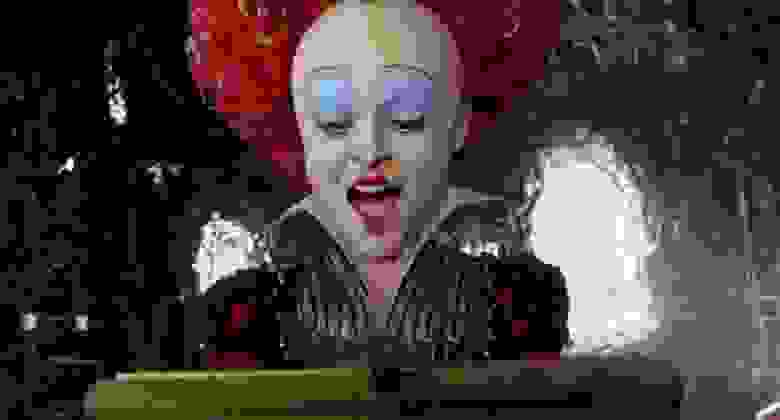
Что такое «Portmanteau»?
«Портмонто» или «слово-чемодан» — это обозначение процесса словообразования, в котором несколько лексических основ сливаются в одно слово, которое получает смысл обеих лексем.
Слово «portmanteau» сформировано из двух французских слов: «porter» (нести) и «manteau» (манто, плащ). Его создал Льюис Кэрролл, чтобы обозначать авторские слова в книгах «Алиса с стране чудес» и «Алиса в Зазеркалье».
You see it’s like a portmanteau — there are two meanings packed up into one word.
Понимаешь, это слово как бумажник. Раскроешь, а там два отделения! Так и тут — это слово раскладывается на два!«Алиса в Зазеркалье», пер. Н. Демуровой.
Собственно, именно Льюис Кэрролл впервые обратил внимание на этот лексический феномен. И даже на основе «портмонто» написал стихотворение «Бармаглот» (Jabberwocky), которое вошло в «Алису в Зазеркалье».
Вот первая строфа:
Twas brillig, and the slithy toves
Did gyre and gimble in the wabe;
All mimsy were the borogoves,
And the mome raths outgrabe.
В легендарном переводе Дины Орловской это звучит так:
Варкалось. Хливкие шорьки
Пырялись по наве,
И хрюкотали зелюки,
Как мюмзики в мове.
При этом каждая из этих странных конструкций имеет свое значение. Переводчик в лице Шалтая-Болтая даже сделала комментарии к каждому из слов:
- Варкалось — восемь часов вечера, когда уже пора варить ужин, но в то же время уже немножечко смеркалось
- хливкий — хлипкий и ловкий;
- шорёк — помесь хорька (в оригинале — барсука), ящерицы и штопора;
- пыряться — весело прыгать, нырять, вертеться;
- нава — трава под солнечными часами (простирается немного направо, немного налево и немного назад);
- хрюкотать — хрюкать и хохотать (вариант — летать);
- зелюк — зелёный индюк (в оригинале — зеленая свинья);
- мюмзик — птица; перья у нее растрепаны и торчат во все стороны, как веник;
- мова́ — далеко от дома (Шалтай-Болтай признается, что сам в этом не уверен).
Переводчик отлично передала словообразовательные приемы Кэрролла, даже сохранив абсурдность стихотворения вместе с оттенками смыслов.
«Портмонто» в реальной жизни
Кэрролл отлично показал, как подобные «слова-чемоданы» работают в литературе. Но интересно то, что в реальной жизни мы тоже используем много подобных слов. И зачастую даже не замечаем этого.
Поэтому мы собрали для вас несколько наиболее распространенных и интересных слов-чемоданов.
Animatronic (animate + electronics)
Аниматроника
Аниматроника — это роботы, которые внешне похожи на животных: от милых высокотехнологичных игрушек до грузчиков и доставщиков. Слово активно используется и в русском языке.
Думаю, вы уже видели такого пса-робота. Это и есть аниматроника.
Bionic (biology + electronic)
Бионический
Бионика — это настоящее спасение для людей, которые потеряли конечности. Сегодня создаются бионические протезы рук и ног, которые по функционалу лишь немного уступают реальным.
Единственный минус — если вовремя не зарядить такие конечности, то они временно превращаются в статичный кусок металла.
Bollywood (Bombay + Hollywood)
Болливуд
Уверены, все видели индийские фильмы, в которых обязательно танцуют, находят родственников и показывают невероятные акробатические способности.
Слово «Болливуд» было придумано еще в 1970-х, когда американский и европейский рынок познакомился с большим количеством индийских фильмов. А в 2001 году слово было официально включено в Оксфордский словарь английского.
Brunch (breakfast + lunch)
Бранч
Это слово чисто американское. Бранч — это прием пищи, в котором объединяются завтрак и обед. Актуально для тех, кто вместо завтрака только пьет кофе.
Часто бранч употребляют с каким-нибудь алкогольным напитком. Поэтому это, скорее, синоним очень плотной и неспешной дневной трапезы.
Chocoholic (chocolate + alcoholic)
Шокоголик
Наше самое любимое. Шокоголик — это человек, который жить не может без шоколада и буквально зависим от него.
Cosplay (costume + play)
Косплей
Косплеем сейчас никого не удивишь. По всему миру проводятся фестивали Comic-Con, на которых энтузиасты переодеваются в своих любимых персонажей из комиксов, аниме, игры и фильмов.
Cyborg (cybernetic organism)
Киборг
Это слово уже давно вошло в нашу речь с подачи писателей-фантастов. На самом деле это портмонто от «кибернетический организм».
Интересно то, что сам термин был придуман медиками в 1960 году при создании концепции расширения возможностей человека для выживания вне Земли. Писатели подхватили термин и стали активно его использовать.
Edutainment (education + entertainment)
Эдютейнмент
Крутое слово, которое мы очень любим. Потому что сами внедряем принципы «edutainment» в массы. «Обучение с помощью развлечения» — его можно назвать так.
Когда студенту нравится процесс учебы и он получает от него удовольствие, то результаты в разы и даже на порядки лучше тех, что можно достичь с помощью зубрежки. В систему «эдьютейнмента» входит много особенностей. Представим на примере изучения английского:
- изучение английского с помощью сериалов и фильмов
- геймификация занятий, когда за каждое выполненное упражнение начисляются «очки опыта»
- соревновательный элемент, в котором отмечают студентов, достигших лучших результатов или сравнивают результаты этого же студента в разный период времени
Игровое обучение позволяет мотивировать и вдохновлять студента на учебные достижения. И в этом его ценность.
Internet (inter + network)
Интернет
Да-да, «интернет» — это тоже «слово-чемодан». Многие считают, что слово образовалось от «international network», но это не совсем так.
На самом деле оно появилось в 1984 году для обозначения внутренней сети Министерства обороны США. «Internet» — это сокращение от «Internetwork» (внутренняя сеть).
Тем не менее, сегодня значение «international network» более точное. Потому что «внутренней сетью» современный интернет уже никак назвать нельзя.
Workaholic (work and alcoholic)
Трудоголик
Слово «трудоголик» уже давно вошло в русский лексикон и было создано независимо от английского портмонто-варианта. И значения у слов абсолютно одинаковы — человек, который слишком много работает.
Smog (smoke + fog)
Смог
Настоящий бич больших индустриальных городов. Впервые слово появилось в 1905 году в газете «Daily Graphic». Автор статьи создал его для описания лондонского дымового тумана.
Активно этот термин стал использоваться после время Великого смога 1952 года в Лондоне, который стал причиной тысяч смертей жителей столицы.
Кстати, для смога природного происхождения — например, из-за извержения вулканов — в английском языке есть отдельное слово — «vog». Как вы уже поняли, это портмонто из «vulcanic smog» — так сказать, «слово-чемодан» в квадрате.
Biopic (biography + picture)
Байопик
Модное слово, которое в последнее время стало очень популярным. А все из-за того, что за последнее время вышло много биографических фильмов о известных людях. К примеру, «Богемская рапсодия» (2018) о музыканте Фредди Меркьюри, «Жертвуя пешкой» (2014) о шахматисте Бобби Фишере, «Жизнь в розовом цвете» (2007) о певице Эдит Пиаф, «Король говорит» о короле Британии Георге VI или «Игры разума» о математике Джоне Нэше.
Фильмы, основанные на биографии известных и не очень личностей, превратились в отдельный жанр, который и получил название «байопик». Но если на русском слово не слишком популярно, то в английском используется довольно часто.
Hangry (Hungry + Angry)
На наше мнение, подобного слова очень не хватает в русском языке. Оно очень емкое и примерно означает «настолько сильно голоден, что зол от этого».
***
Вот так шуточная инициатива писателя превратилась в полноценный инструмент для словообразования в английском языке и не только. Причем многие даже не задумываются над этимологией слов, которые используют.
А какие «слова-чемоданы» вы еще знаете? Особенно нас интересуют портмонто из профессиональных сфер. Не стесняйтесь, делитесь со всеми!
Онлайн-школа EnglishDom.com — вдохновляем выучить английский через технологии и человеческую заботу
Только для читателей Хабра первый урок с преподавателем по Skype бесплатно! А при покупке занятий получите до 3 уроков в подарок!
Получи целый месяц премиум-подписки на приложение ED Words в подарок.
Введи промокод portmanteau на этой странице или прямо в приложении ED Words. Промокод действителен до 25.06.2021.
Наши продукты:
- Учи английские слова в мобильном приложении ED Words
- Учи английский от А до Z в мобильном приложении ED Courses
- Установи расширение для Google Chrome, переводи английские слова в интернете и добавляй их на изучение в приложении Ed Words
- Учи английский в игровой форме в онлайн тренажере
- Закрепляй разговорные навыки и находи друзей в разговорных клубах
- Смотри видео лайфхаки про английский на YouTube-канале EnglishDom
Portmanteau Words: Meaning, Uses and Examples
From Brangelina to Bromance
An example of a portmanteau word: motel = motor + hotel.
Benjamin Rondel / Getty Images
Updated on September 14, 2017
A portmanteau word is a word formed by merging the sounds and meanings of two or more other words. More formally known as a blend.
The term portmanteau word was coined by English writer Lewis Carroll in Through the Looking-Glass, and What Alice Found There (1871). Later, in the preface to his nonsense poem The Hunting of the Snark (1876), Carroll offered this explanation of «Humpty-Dumpty’s theory of two meanings packed into one word like a portmanteau»:
[T]ake the two words «fuming» and «furious.» Make up your mind that you will say both words, but leave it unsettled which you will say first. Now open your mouth and speak. If your thoughts incline ever so little towards «fuming,» you will say «fuming-furious»; if they turn, by even a hair’s breadth, towards «furious,» you will say «furious-fuming»; but if you have the rarest of gifts, a perfectly balanced mind, you will say «frumious.»
Examples and Observations:
- Brangelina (Brad Pitt + Angelina Jolie)
- bromance (brother + romance)
- Cronut™ (croissant + doughnut)
- dramedy (drama + comedy)
- Frankenfood (Frankenstein + food)
- infomercial (information + commercial)
- motel (motor + hotel)
- netiquette (net + etiquette)
- Oxbridge (Oxford + Cambridge)
- pixel (pic + element)
- quasar (quasi-stellar + star)
- sexpert (sex + expert)
- sexting (sex + texting)
- smog (smoke + fog)
- splatter (splash + spatter)
- statusphere (status + atmosphere)
- Tanzania (Tanganyika + Zanzibar)
- telethon (television + marathon)
- Viagravation (Viagra + aggravation)
- «A word formed by fusing elements of two other words, such as Lewis Carroll’s slithy from slimy and lithe. He called such forms portmanteau words, because they were like a two-part portmanteau bag. Blending is related to abbreviation, derivation, and compounding, but distinct from them all.»
(Tom McArthur, «Blend.» The Oxford Companion to the English Language. Oxford University Press, 1992)
The Sound Bites of Modern English
- «[D]ancercise, simulcast, Frappuccino — they wear their meanings on their shortened sleeves. Portmanteau words are the sound bites of modern English, calculated to catch on the first time people hear them.»
(Geoffrey Nunberg, The Way We Talk Now. Houghton Mifflin, 2001) - «Smirting happens when two people, smoking outside, fall to flirting, and discover that they have more in common than simply nicotine. In Ireland, where the term originated after the ban in 2004, there is even evidence of non-smokers joining the smoky throng outside because the atmosphere there is more flirtatious.
«Smirting is a portmanteau word, formed by packing parts of two words together to create another, combining the sense of each.»
(Ben Macintyre, «Ben Macintyre Celebrates the Portmanteau.» The Times, May 2, 2008)
Portmanteau Survivors: Dumbfound, Flabbergasted, Gerrymander
- «Portmanteau words are frequently more whimsical than useful and don’t survive, but many exist. … Dumbfound, from dumb and confound, was put together in the 17th century. Flabbergasted, one of the more contrived, is apparently an 18th-century blend of flabby and aghast. Gerrymander combines the name of Governor Elbridge Gerry and salamander, referring to the shape of a redistricted Massachusetts county. Anecdotage, adding the implication of dotage to anecdote, and Clifton Fadiman’s hullabalunacy from hullabaloo and lunacy, are clever enough to deserve survival.»
(Robert Gorrell, Watch Your Language!: Mother Tongue and Her Wayward Children. University of Nevada Press, 1994)
Portmanteau Games
- «Two games can be played with portmanteau words. In the first game, one player thinks of a portmanteau word and asks the next player to say which words are blended to create it. In the second game, players try to make up new, humorous portmanteau words and give their definitions. Thus you might blend the words hen and endurance to make hendurance, meaning ‘the patience of a hen trying to hatch out an egg.’ Or you could blend the name of the dog Rin-tin-tin (who starred in films) and the word tintinnabulation to get Rin-tin-tintinnabulation: a very loud ringing of bells.»
(Tony Augarde, The Oxford A to Z of Word Games. Oxford University Press,1994)
The Lighter Side of Portmanteau Words
- «So a blog is a web log? Is there an apostrophe, or do you guys not even have the strength for that? You’re just going to jam two words together?»
(Stephen Colbert, The Colbert Report, Feb. 2006) - «In her first tweet, [Sarah] Palin didn’t write speak out; she used another term — refudiate. A few minutes later, the Tweet was rewritten with refudiate — which is not actually a word — removed, replaced by refute. …
«The word caught someone’s attention, because a few hours later Palin refused to refute refudiate, she tweeted that she’s just following in Shakespeare’s footsteps.
«‘Refudiate, misunderestimate, wee-wee’d up. English is a living language. Shakespeare liked to coin new words too. Got to celebrate it!'»
(Carolyn Kellogg, «Wherefore Art Thou, Refudiate? Sarah Palin as Shakespeare.» Los Angeles Times, July 19, 2010)
Pronunciation: port-MAN-tow
Also Known As: blend
What is a portmanteau word, or a portmanteau? A one-sentence definition is easy enough: a portmanteau word is, in summary, a word that has been formed by blending two existing words together. So, for instance, a motel is from motor + hotel, brunch is from breakfast + lunch, and smog is from smoke + fog. But there are some curious aspects of portmanteau words – not least that term’s origin – which are worth delving into.
The term ‘portmanteau word’ has its origins in one of the best-loved works of children’s literature, Through the Looking-Glass by Lewis Carroll, published in 1871. In that sequel to Alice’s Adventures in Wonderland, Carroll includes a poem, ‘Jabberwocky’, which begins:
’Twas brillig, and the slithy toves
Did gyre and gimble in the wabe:
All mimsy were the borogoves,
And the mome raths outgrabe.
You can read the rest of ‘Jabberwocky’, and learn more about it, here. The key thing that interests us here is Carroll’s use of (invented) words in this opening stanza of the poem. What are ‘toves’, and why are they ‘slithy’? What does ‘slithiness’ (is that a word?) look or feel like? The same with ‘mimsy’. Noam Chomsky’s ground-breaking work in linguistics surrounding children’s ability to acquire a linguistic ‘grammar’ demonstrated that even if we don’t know the meaning of a word, we can often deduce what kind of word it is: i.e. we know ‘mimsy’ is an adjective, or describing-word, even though we don’t fully know what ‘mimsiness’ is.
Carroll is using both ‘slithy’ and ‘mimsy’ as portmanteau words: slithy, for example, is a blend of slimy + lithe, while mimsy suggests miserable + flimsy. Another term for a portmanteau word is, in fact, a blend, and some linguists prefer to use the word blend. But the term ‘portmanteau’ came about because, after Alice has encountered the poem ‘Jabberwocky’ in Through the Looking-Glass, and puzzled over the meaning of these unfamiliar words, she meets Humpty Dumpty, who tells her, when she quotes the above stanza:
‘That’s enough to begin with,’ Humpty Dumpty interrupted: ‘there are plenty of hard words there. “Brillig” means four o’clock in the afternoon — the time when you begin broiling things for dinner.’
‘That’ll do very well,’ said Alice: ‘and “slithy”?’
‘Well, “slithy” means “lithe and slimy”. “Lithe” is the same as “active”. You see it’s like a portmanteau — there are two meanings packed up into one word.’
A portmanteau was, in Victorian times, a case or bag for carrying clothing while travelling; the word is from the French meaning literally ‘carry the cloak’.
Curiously, both slithy and mimsy had independent lives separate from Lewis Carroll’s use of them: William Whately had used ‘slithy’ (as a variant of ‘sleathy’, meaning slovenly or careless) in 1622, while mimsy, with a slightly different meaning (‘prim; affected; feeble; 
A good number of portmanteau words are, fittingly enough, words which are used to describe hybrid animals or crossbreeds: so a cockapoo (cocker spaniel + poodle) is a crossbreed of those two breeds of dog, while a liger (lion + tiger) is the offspring of a male lion and a female tiger. (Similarly, a tigon, from tiger + lion, is the offspring of a lioness and a male tiger.) So a portmanteau word is a handy construction for describing two things which have been joined together in some way. Portmanteau words, as a branch of word-formation, are relatively recent: all of the examples given in this introduction to the form date from the mid-nineteenth century or later. Lewis Carroll wasn’t late to the party in defining or naming the portmanteau word: he arrived just in time.
Some words are portmanteaus but their origins as portmanteaus aren’t as obvious. For example, the word meld, meaning to merge two things together, is an example of a portmanteau word: it’s from the words melt + weld. (There is a separate and rarer word, ‘meld’, which is used in card games and means to announce one’s hand or one’s bet; but that word is derived from the German melden, meaning ‘announce’.) And it’s easy to forget that Wi-Fi (Wireless + Fidelity), breathalyser (breath + analyser), and podcast (actually from the brand name iPod + broadcast) are all examples of portmanteau words.
It’s worth, by way of conclusion, contrasting the portmanteau word or blend with another type of word-formation: the compound word. A compound is where two words are placed together, e.g. house + boat = houseboat, or dog + food = dogfood. In a portmanteau word, there is always some abbreviation of one or both of the words involved: so smog takes the first two letters of smoke and the last two letters of fog but ditches the rest. Even in cockerpoo, the term spaniel is lost from the first term, cocker spaniel. A portmanteau word packed two meanings up into its carry-case, but some letters are always jettisoned.
Ever stopped at a motel for brunch? Or perhaps for a portmanteau or two? These are words, like motel and brunch, formed by mixing two other terms. Some are common in speech and writing, so you may have used them without realizing they were portmanteaus. But you can also use portmanteaus creatively. So how do these words work?
What Is a Portmanteau?
As mentioned above, a portmanteau is a word made up of two words. We can see this if we look more closely at the examples above: motel and brunch.
As a combination of “motor” and “hotel,” “motels” are small hotels for motorists located near roads and highways.
And with “brunch,” we have a combination of “breakfast” and “lunch,” denoting a meal after breakfast but before lunch.
Contractions also combine two words, but only words that would ordinarily appear in sequence, such as how “do not” becomes “don’t.” And, importantly, you don’t need an apostrophe to show where words join in a portmanteau. Contractions and portmanteaus are therefore quite different.
Interestingly, “portmanteau” is itself a portmanteau! In the 19th century, a portmanteau was a suitcase with two equal parts. Its name came from combining the French words porter, meaning “carry,” and manteau, meaning “cloak,” as these cases were used for carrying clothes while traveling.
Its modern sense of a word made up of two words came from children’s author Lewis Carroll. In the novel Through the Looking Glass, Humpty Dumpty’s character explains two portmanteaus:
Well, “slithy” means “lithe and slimy” and “mimsy” is “flimsy and miserable.” You see it’s like a portmanteau—there are two meanings packed up into one word.
So a “portmanteau” is like a suitcase packed with two words!
Using Portmanteaus Creatively
Portmanteaus are a great way to get creative with language. We’ve already seen Lewis Carroll’s explanation of “slithy” and “mimsy,” which were terms he invented for his famous poem “Jabberwocky.”
Came whiffling through the tulgey wood.
The key is picking two words that sound good together and combining their meanings to create something new. Why not give it a go in your writing?
Examples of Portmanteaus
Finally, let’s look at some words you may or may not know are portmanteaus:
|
Portmanteau |
Words Combined |
Meaning |
|
Spork |
Spoon + Fork |
A utensil that you can use as a spoon or fork. |
|
Dumbfounded |
Dumb + Confounded |
To be struck speechless with surprise or confusion. |
|
Infotainment |
Information + Entertainment |
Material that intends to both entertain and inform. |
|
Emoticon |
Emotion + Icon |
The use of punctuation marks and other characters to depict an emotion, e.g., a smiley.
🙂 |
|
Podcast |
iPod + Broadcast |
A digital audio broadcasting format first popularized via the iPod media player. |
|
Internet |
International + Network |
A network of interconnected computers. |
|
Smog |
Smoke + Fog |
Fog mixed with smoke or other pollutants. |
|
Brexit |
Britain + Exit |
The exit of the United Kingdom from the European Union. |
|
Jazzercise |
Jazz + Exercise |
A combination of jazz dance and exercise. |
|
Pokémon |
Pocket + Monsters |
A stylised play on the Japanese brand name “Pocket Monsters.” |
And however you use portmanteaus in your writing, we have expert editors available to help you ensure your documents are always error free!
Find this useful?
Subscribe to our newsletter and get writing tips from our editors straight to your inbox.

